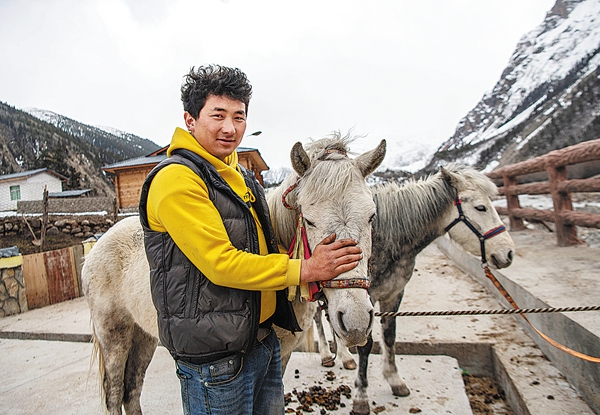Agencies support demand for countryside tourism
By Zhu Wenqian | China Daily | Updated: 2022-04-30 15:19

For those who took trips to rural areas, nearly 40 percent of total travelers went with elderly family members or their children. Most people took tours within a three-hour drive, and self-driving is the top choice for travelers, according to Tuniu Corp, an online travel agency based in Nanjing, Jiangsu province.
"Tourists' expectations for rural tourism are no longer limited to enjoying natural sceneries. Rural food, folk customs, ancient village relics, high-quality guesthouses, local specialties and cultural products are all important factors to draw travelers' attention," said Zha Tingting, director of nearby area travel at Tuniu.
"What urban tourists would like to pursue the most in rural trips are unique life and cultural experiences. Some distinguished products that are related to delicious food and ecological sightseeing have been more popular," Zha said.
"We will continue to upgrade and enrich our rural tourism products offerings and provide better travel experiences for tourists. We will also expand cooperation with more local companies in different destinations," she said.
Gaogang Village, a village in Nanjing, has become a new popular rural tourism destination for nearby urbanites. The village has renovated idle private houses into various creative spaces such as bed-and-breakfast accommodation, cafes, study rooms and a children's playground, and thus travelers will be able to participate in diverse activities there.
Tuniu cooperated with Gaogang Village and launched a country fair in the village. The country fair sells local specialties such as rice, rapeseed oil, dried tofu and shrimp sauce. Travelers will be able to buy some local agricultural products easily, and it helps boost farmers' revenues.
Meanwhile, Shanghai-listed Tibet Tourism Co Ltd said the company's business has shown significant potential for future growth since the COVID-19 pandemic, as the suspension of outbound travel has promoted domestic tourism in the region. More Chinese consumers are seeking to take longer trips to more remote regions in the country. Favorable policies that support the development of rural tourism have also given a boost to the local tourism sector.
Last year, Tibet Tourism achieved sales revenues of 174 million yuan ($26.5 million), up 37.97 percent year-on-year. During the period, its net profit reached 4.74 million yuan, down 270 percent year-on-year, according to its annual earnings report.
In 2021, Tibet autonomous region received 41.5 million travelers, and the number grew 3.75 percent over 2019 when there was no pandemic. The autonomous region achieved tourism revenues of 44.1 billion yuan, and the local tourism market has been stable and robust, according to the local government.
Currently, China has nearly 200,000 companies that are involved in business related to rural family catering and accommodations, and more than half of the total were registered in the past five years, fueled by urbanites' demand of seeking healthy and natural lifestyles, according to corporate information provider Tianyancha.
Sichuan province has the highest number of such rural family business operators, and the volume there accounts for 12 percent of the total nationwide. It is followed by Hubei province and Chongqing, Tianyancha found.
























